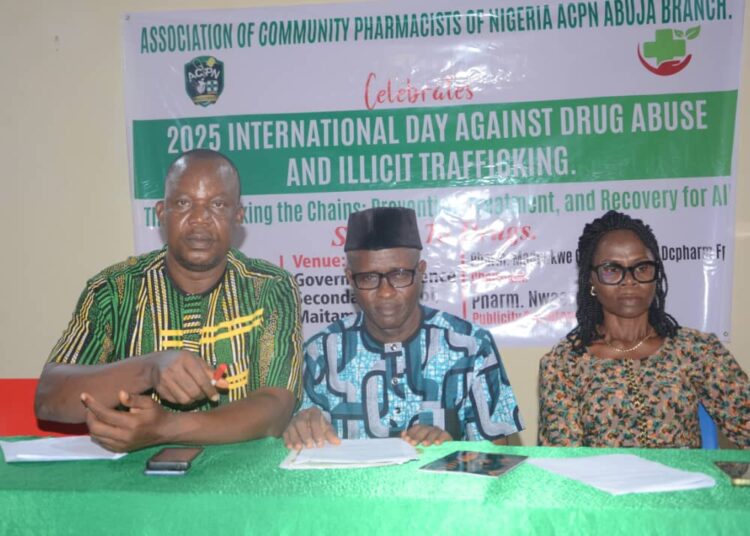The Chairman of the Pharmaceutical Society of Nigeria (PSN), Abuja Branch, Pharm. Chimaeze Maduekwe, has described community pharmacies as vital frontline responders in the fight against drug abuse, emphasizing their role in early detection, access to treatment, and prevention of illegal distribution of controlled substances.
Speaking at an event to mark the 2025 International Day Against Drug Abuse and Illicit Trafficking (World Drug Day) I’m Abuja, Maduekwe noted that pharmacies serve as “gateway keepers,” ensuring that prescription medications such as opioids, tramadol, and benzodiazepines are dispensed strictly in line with regulatory guidelines.
“We help prevent the misuse and illegal distribution of controlled drugs by enforcing the required checks before dispensing. Our role extends beyond medication – we are often the first to notice the physical and behavioral signs of substance misuse due to our regular interactions with patients,” he said.
Maduekwe highlighted how pharmacists engage in confidential conversations and clinical observation to identify red flags and refer individuals to appropriate care, making them crucial players in early intervention.
Beyond prevention, he said pharmacies also serve as referral hubs, linking individuals with addiction issues to treatment centers and mental health services.
“We collaborate with NGOs, public health units, and psychiatric professionals to ensure a continuum of care,” he explained.
Calling for a shift from punitive approaches to health-based interventions, Maduekwe aligned the pharmacists’ approach with the theme of this year’s World Drug Day, which advocates for compassion over criminalization.
“Often, we criminalize substance users, and it hasn’t produced meaningful results. When we respond with empathy and support, we help people find the path to recovery,” he stressed.
The PSN Abuja Chairman also underscored the importance of collaboration with regulatory agencies such as the Pharmacists Council of Nigeria (PCN), the National Agency for Food and Drug Administration and Control (NAFDAC), and the National Drug Law Enforcement Agency (NDLEA).
These partnerships, he said, aid in surveillance, enforcement, and dismantling illegal drug supply chains.
Maduekwe revealed that many community pharmacies are part of local drug control committees, contributing to grassroots advocacy, policy implementation, and community policing efforts.
He added that pharmacies are increasingly becoming safe, stigma-free spaces where individuals can seek information, counseling, and recovery support without fear of judgment.
To further enhance their impact, he outlined key advocacy points by the Association of Community Pharmacists of Nigeria (ACPN), FCT branch. These include: Continuous training for pharmacists on addiction management and communication.Government support to integrate pharmacies into national rehabilitation and harm reduction frameworks.Stronger enforcement against unlicensed pharmaceutical outlets.Inclusion of pharmacists in school-based drug education programs. Enactment and enforcement of prescription-only drug dispensing policies and mandating that medications be dispensed solely within licensed pharmacy premises.
“Community pharmacists in the FCT and across Nigeria are essential allies in the battle against drug abuse. With stronger institutional support, education, and collaboration, we can break more chains and offer renewed hope to affected individuals and families,” Maduekwe concluded.
We’ve got the edge. Get real-time reports, breaking scoops, and exclusive angles delivered straight to your phone. Don’t settle for stale news. Join LEADERSHIP NEWS on WhatsApp for 24/7 updates →
Advertisement











